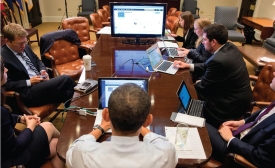21st century statecraft

Andreas Sandre, in his recent book, Digital Diplomacy: Conversations on Innovation in Foreign Policy, sheds light on the evolving practice of digital diplomacy in the 21st century. Sandre presents potential challenges and opportunities that all diplomats now face in using digital media and new technologies.
This video highlights some of the key findings of Burson-Marsteller's Annual Twiplomacy Study which was recently updated to look more specifically at the connections between heads of state and governments and foreign ministers, covering a record 161 countries and 643 Twitter accounts.
Easily overlooked amid the flurry of reforms in Myanmar, a diplomatic retooling is taking place at the US Embassy in Yangon. Cubicles that were once empty have found new occupants, relationships that had turned cold during two decades of political isolation are thawing and public diplomacy is flourishing.
In the near future, no one will be able to become a leader without digital followers, and no diplomat will be well-positioned to represent his or her country if he or she does not personally engage on social networks. And it is not the size of the followership that matters, but the quality of the conversations.
MINUTES after last week’s violent attacks on America’s missions in the Middle East, the country’s embassy in Cairo was already on Twitter. It tweeted an emergency number for American citizens. It criticised Egypt’s Muslim Brotherhood for supporting the protests on their Arabic feed. And it thanked fellow tweeters for their condolences on the murder of the American ambassador to Libya, Christopher Stevens.
Is it really possible to explain in 140 characters or less the policies of an institution with 19,000 employees, a $27-billion budget, and 250 locations worldwide? Sure, says Victoria Esser ’94, the first-ever deputy assistant secretary of public affairs for digital strategy for the U.S. Department of State.
Secretary Clinton’s remarks will always strike a chord for 21st Century Statecraft and open Internet initiatives... Let’s not forget the digital uprisings that came as a result of the SOPA/PIPA protests in the United States earlier this year, topped off with the shut down of Wikipedia and Reddit among others.







